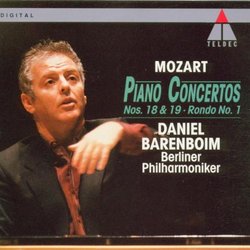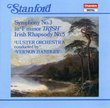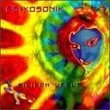| All Artists: Mozart, Barenboim, Bpo Title: Piano Concerti 18 & 19 Members Wishing: 0 Total Copies: 0 Label: Elektra / Wea Release Date: 1/24/1995 Genre: Classical Styles: Forms & Genres, Concertos, Historical Periods, Classical (c.1770-1830), Instruments, Keyboard Number of Discs: 1 SwapaCD Credits: 1 UPC: 745099067427 |
Search - Mozart, Barenboim, Bpo :: Piano Concerti 18 & 19
 | Mozart, Barenboim, Bpo Piano Concerti 18 & 19 Genre: Classical
|
Larger Image |
CD DetailsSimilar CDs
|
CD ReviewsBubbling with energy! janus_kreisler_sachs | the Midwest, USA | 06/08/2001 (5 out of 5 stars) "Barenboim has never been one of my favorite pianists or conductors -- he follows so many of those lazy "traditions" (in the worst sense of the word) in modern performance practice, making a good amount of his recordings incredibly stodgy. Then, I listened to this CD, and was pleasantly surprised that the performances are full of life and energy, yet also guided by impeccable taste. No stodginess here, I'll tell you! Mozart is one of my favorite composers, yet he is ofted performed too romantically (slow "profound" tempi, over-thick textures, little variety of articulation, etc.) or too cautiously (eternally stuck between mf and mp, little rise and fall in how phrases are projected, etc.). Barenboim gets practically all the parameters right in this recording, which is invigorating from start to finish. The D major Rondo is lively and playful rather than the usual plainly pretty treatment it gets from performers in general. The middle movements of both concerti move at a healthy pace, with no attempt at boring "gravitas". The slow movement of the 18th concerto is especially touching -- its shy, pensive theme (rather similar to Barbarina's aria in Figaro) is projected with warmth and sympathy, rather than attempting to make it a 19th century melodrama. The 19th concerto (a favorite of mine) is infectiously energetic (and fast!) from beginning to end (though Barenboim doesn't overlook the shades of melancholy in the slow movement). The last movement in particular is almost like a roller-coaster ride! This is by far the best recording of the 19th concerto to date (far better than those by Serkin, Goode, Perahia, and Brendel). The Berlin Philharmonic has never been a great Mozart orchestra in my opinion, but they follow Barenboim's lead and play with life (and no unwelcome lush, which is something of an achievement for this ensemble!). Although other releases in this team's Teldec Mozart piano concerto cycle are not as good, you shouldn't hesiste to acquire this CD if you're interested in these three works or Mozart's piano concerti in general." Extremely wise reading of the Piano concerto No. 18! Hiram Gomez Pardo | Valencia, Venezuela | 12/30/2004 (5 out of 5 stars) "It has been said very often the greatest piano concertos of Mozart begin since the Kv. 466 . To my mind that concept is not totally right .
If you check the year 1784 was particularly fructiferous for Mozart, but also signified his first connections with the Masons . He composed six Concerts for Piano from the Kv 449 (14) to Kv. 459 , The String Quartet in B flat major to Haydn (curious written in the same tonality) don't you? The Piano Sonata Kv. 457 in C Minor (tragic tonality per excellence) , and an interesting point t remark : He didn't compose any Symphony between 1783 (37) and 1786 (38) , The Prague in D major I mean sixty works between Kv 444 and Kv 504 .and only two Symphonies were written in this tonality (5) kv. 1765 and the (24) Kv 182 in 1774 , the first Piano Sonata for Violin and Piano written in 1785 Kv. 481 is also written in the same tonality and the last Piano Concerto is written in B flat major in 1791 , and the first work for Piano Solo written in 1785 is - guess what - The Fantasy in D Minor Kv . 475 . Let me remember you the C minor is the same tonality of Beethoven fifth Symphony ; so the question is why? My argument is that Mozart was somehow looking the tragic side of the life and needed to breathe of the Symphonic works and look inside his spirit. The dark clouds which involve this Andante is very revealing about what was happening in the heart and soul of Mozart. If you analyse carefully the First and Third Movement are written operatically but attention with the Andante un poco sostenuto you feel the all embracing presence of the tragedy not only suggested as he made it in the Second Movement of his Ninth Concert D major another tragic tonality (another mere coincidence perhaps?). The inner dragons spied on the febrile imagination of Wolfang Amadeus Mozart who entered in the thiving Masonic Comunity at the end of 1784 . Barenboim playing and conducting the Berlin Philharmonic has been to my mind together with Schiff - Vegh the only two performers that somehow have been able to watch this essential detail. That is why both interpreters are today in the top as the Best Mozart players in the world ." |

 Track Listings (7) - Disc #1
Track Listings (7) - Disc #1


